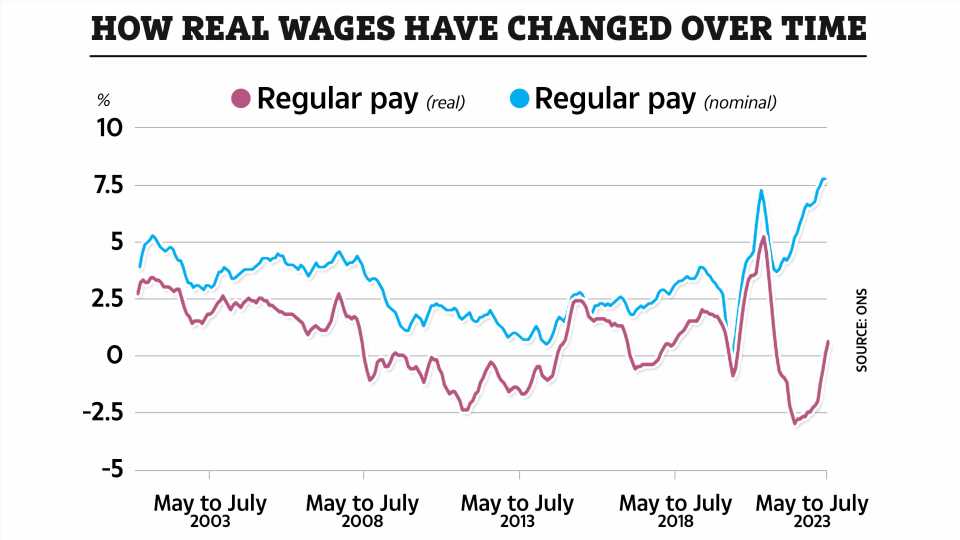WAGES are still on the rise for millions of workers across the UK.
Official figures released today by the Office for National Statistics (ONS) have revealed that pay is still growing at its fastest rate on record.

The figures reveal regular pay, excluding bonuses, stood at 7.8% in May to July this year.
This is the same as the previous three-month period and the highest annual growth rate since comparable records began in 2001.
Growth in employees' average total pay, which included bonuses, was 8.5%.
This is the largest annual growth rate seen outside the coronavirus pandemic period, according to the ONS.
READ MORE IN MONEY

UK inflation rate falls again to 6.8% in July – what it means for your money

Wages rise for millions of workers again – what it means for your money
Last month the ONS announced that for the months of April to June, total pay including bonuses was up 8.2%.
Taking into account inflation, which is currently 6.8%, total real pay rose by 1.2% on the year – it was last higher in January to March 2022 at 1.4%.
Regular real pay rose by 0.6% on the year; it was last higher in August to October 2021 when it rose by 1.0%.
It's the first time that pay growth has actually caught up with rising prices in over a year.
Most read in Money
 MONEY MUNCHER
MONEY MUNCHER
Shoppers fuming as iconic snack almost doubles in price within a year
 HOME TRUTHS
HOME TRUTHS
I won £2m house in lottery but got just £5k instead due to ‘confusing loophole’
 SHUT UP SHOP
SHUT UP SHOP
Wilko confirms date 124 stores will close next week – is yours on the list?
 ALL GONE
ALL GONE
Full list of 24 Wilko shops closing TOMORROW as all 400 stores to shut forever
Darren Morgan, director of economic statistics at the ONS, said: "Earnings in cash terms continue to increase, at a record rate outside the pandemic-affected period.
"Coupled with lower inflation, this means people’s real pay is no longer falling.”
The yearly average regular pay growth for the public sector was 6.6% in May to July, for the private sector this was 8.1%.
Meanwhile, the rate of UK unemployment rose to 4.3% in the three months to July from 4.2% in the previous three months.
The number of vacancies in June to August was 989,000, a decrease of 64,000 from the three months to May.
Chancellor of the Exchequer Jeremy Hunt said: “It’s heartening to see the number of employees on payroll is still close to record highs and that our unemployment rate remains below many of our international peers.
“Wage growth remains high, partly reflecting one-off payments to public sector workers, but for real wages to grow sustainably we must stick to our plan to halve inflation.”
What it means for your money
A growth in wages is good news for millions of workers who have been battling high inflation in recent months.
Alice Haine, personal finance analyst at Bestinvest, said: "In real terms, once inflation is factored in, real pay grew 0.6% and total pay 1.2%, offering some relief for households who have seen their disposable incomes battered by the cost of living crisis."
Today's announcement is key to several money changes coming over the next few weeks including the Bank of England (BoE) base rate announcement next week and pension triple lock.
Ms Haine added: "While the Bank of England is likely to welcome signs the tight labour market is softening, it will be less accommodating about accelerating wage growth.
"With the momentum in wage growth still so strong, the BoE is expected to push ahead with a 25-basis point interest rate rise at its Monetary Policy Committee meeting later this month to prevent pay hikes keeping inflation high."
In recent months rising wages have been blamed for keeping inflation stubbornly high, resulting in base rate hikes by the BoE which have pushed up borrowing costs for millions of households.
The latest wage figures show some of this pressure on household budgets could ease.
But high wages could force the Bank of England to hike rates again next week as it tries to bring inflation back down to its 2% target.
Ms Haine continued: "The latest wage growth data has particular significance for pensioners as it is likely to decide how much the state pension rises next April."
The triple lock sees the state pension rise in line with whatever is highest out of: wages, 2.5% or September's inflation figures.
Inflation currently sits at 6.8% but we won't know the September figure until October when it’s announced for the previous month.
Rising fuel prices in August are likely to lead to a blip in the latest inflation numbers, according to both Chancellor Jeremy Hunt and BoE governor Andrew Bailey.
The latest inflation figures for August are set to be announced next week if things continue the way they are going, wages will remain the higher figure when the state pension increase is revealed.
It means pensions may see their state pension rise by almost 8% in April 2024, this will result in a surge to £221.20 per week from £203.85.
Figures released today could also determine how much rail fares will rise by.
The government aligned this year’s cap on train fare increases with the average earnings growth for July 2022 figure, which was 5.9%.
READ MORE SUN STORIES

BBC radio DJ in on-air rant during final show which bosses tried to silence

Reality star, 36, dies weeks after having second baby as car plunges from cliff
Although it has not been announced whether fares will continue to be based on average earnings growth.
Last month, the Department for Transport said next year’s increases will be below the Retail Prices Index (RPI) inflation for July, which was 9%.
Do you have a money problem that needs sorting? Get in touch by emailing [email protected].
You can also join our new Sun Money Facebook group to share stories and tips and engage with the consumer team and other group members.
Source: Read Full Article


